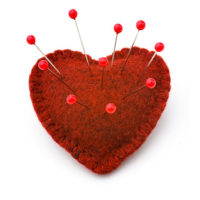Virtually everyone is familiar with Reinhold Niebuhr’s quote: “God grant me the serenity to accept the things I cannot change, the courage to change the things I can, and the wisdom to know the difference.”
There are lots of things over which we have no control, over which we are powerless, and when we refuse to accept our lack of power and control, our lives become an endless series of disappointments, frustrations and sorrows. We might advance in a job, get fired or be unable to find a job. A relationship may last a lifetime, or it could come to an unexpected and premature end. Some things we have power over, and some we do not. So what are the things we cannot change?
In the book The Five Things We Cannot Change (Shambhala Press), David Richo has catalogued the major things we have no control over. According to Richo, they are:
Everything changes and ends. Changes and endings are inevitable for any person, relationship, enthusiasm or thing. Nothing is permanently satisfying. Every beginning leads to a finale. Built into all experiences, persons, places and things is a life span. Our relationships pass through phases. Our bodies age. Our possessions deteriorate. Our memories wane. Species of plants and animals disappear. Earthquakes realign the planet. Seasons change. Everything alive eventually dies. Nothing is permanent.
Things do not always go according to plan. Life is unpredictable and not at our beck and call. We make plans expecting to be in control of what will happen, and many of us find it challenging to let go of our desire to have things turn out the way we wish. This in turn forces us to deal with what happens, and to make the best of it when things don’t go as planned. Sometimes we make mistakes and miscalculations. In the end, we learn that we do not have control over everything.
Life is not always fair. Nature is not always fair. People are not always fair—ourselves included. Sometimes we are taken advantage of. Sometimes we do all the right things and still wind up losing. Sometimes we act cautiously, yet we still get hurt. Others may be generous to us and yet we take advantage of their kindness. We may act with good intentions toward others and yet our efforts go unappreciated or misinterpreted. Everyone learns the same lesson: you win some, you lose some.
Pain is a part of life. Physically, psychologically and spiritually, suffering seems to be an ingredient of growth during every phase of our development. Suffering is built into the very nature of change. Therefore, pain is not punishment and pleasure is not a reward—they are simply features of our existence. In any enterprise or activity, we stand to lose something. We can lose a partner, a parent, a child or a friend. We can be hurt or robbed. We can lose in the stock market, lose at love or lose our heads. To not be able to accept the pain in losses, reverses, endings or unfairness is a disability. We all have to face pain, but we can make it worse if we add our own fear, blame, shame, complaint or obsession. Some people draw pain and crisis to themselves, some have it thrust upon them and make themselves feel more pain by how they react to it.
People are not loving and loyal all the time. Some people act dishonestly. Some lie. Some are hypocritical. Sometimes people keep their promises and sometimes they do not. Sometimes people love us loyally and faithfully, and sometimes they hate, reject, abandon or betray us. Some people will like us and some will dislike us. Some care tenderly about our feelings, and some trample them underfoot. No human being has ever been loved or treated respectfully by everyone. And yes, sometimes we hurt others, don’t keep our promises, reject, act disloyal or misrepresent ourselves.
If you were to accept that there are some things you cannot change or control, how would that help you cope or adapt? Because coping and adapting are two things we can control.





